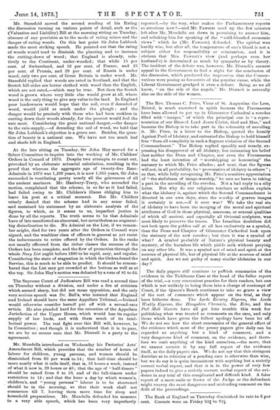Mr. Mundella introduced on Wednesday his Factories' Acts' Amendment Bill,
which provides that the number of hours of labour for children, young persons, and women should be diminished from 60 per week to 54; that half-time should be more nearly what it calls itself, that is, 33 hours a week, instead of what it now is, 39 hours or 40; that the age of " half-timers " should be raised from 8 to 10, and of the full-timers under restriction to 14; and that the hour a day by which women's, children's, and "young persons'" labour is to be shortened should be in the morning, so that their work shall not commence till 7, leaving them more time for sleep and household preparations. Mr. Mundella defended his measure in a very able speech, which has been very imperfectly reported,—by the way, what makes the Parliamentary reports so atrocious now ?—and Mr. Fawcett used up the few minutes left after Mr. Mundella sat down in promising to answer him, and rebuking him for speaking of the "cold-blooded economic views" which he (Mr. Fawcett) defended. The epithet was hardly wise, but after all, the temperature of one's blood is not a subject either for responsibility or crimination, and it is obvious that Mrs. Fawcett's view (and perhaps even her husband's) is determined as much by sympathy as by theory. The incident of the debate was, however, Mr. Disraeli's earnest appeal to the Government to find a night for the conclusion of the discussion, which produced the impression that the Conser- vatives were posing as favourers of the popular cause, while the Liberal Government grudged it even a debate. Being, as we all know, "on the side of the angels," Mr. Disraeli is naturally also on the side of the women. .


































 Previous page
Previous page